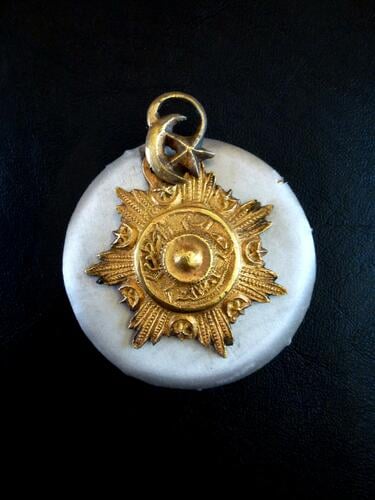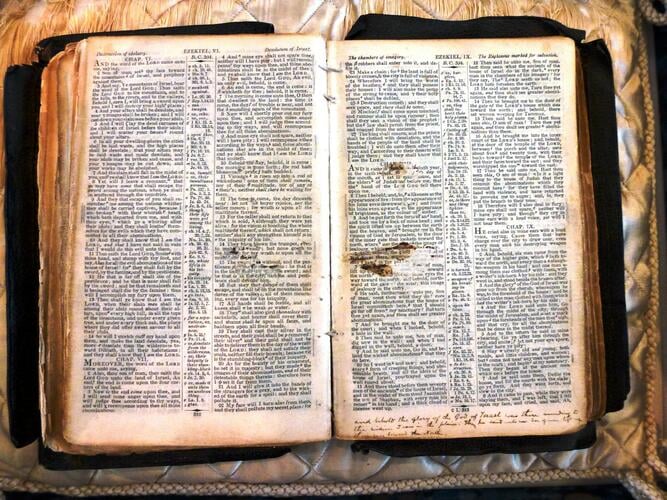-
1 of 253523 objects
General Gordon's Bible. 1831-32
17.0 x 4.0 cm (book measurement (inventory)) | RCIN 1053441

London : Samuel Bagster & Sons
Master: The English version of the Polyglot Bible. . . Item: Silver-gilt Star of Khartoum 1831-32


-
1831/32 octavo edition of The English Version of the Polyglot Bible, published by Samuel Bagster (first printed 1816).
This Bible was owned by the British army officer and colonial administrator General Charles George Gordon. It was given to him on the day of his birth, 28 January 1833, by Amelia Enderby, a relative of his mother.
In 1854, while stationed in Pembroke Dock, he came under the influence of an Irish officer, Francis Drew. Under Drew, Gordon became a devout Christian, an attribute which came to define much of his later career, particularly after his recovery from smallpox in 1862.
In the 1860s, Gordon pursued a successful military career in China, serving as one of the European officers leading the ‘Ever Victorious Army’, a Chinese regiment responsible for putting down the Taiping Rebellion in 1864. He was also recognised for his achievements in defining the border between the Ottoman Empire and Russia following the Crimean War (1853-1856).
From 1872, his career took him to Africa. He began by assisting the Khedive of Egypt, Isma'il Pasha, in his imperial ambitions in Sudan (then a part of Egypt) and central Africa, before undertaking various roles in colonial administration in the British central African colony of Equatoria (now South Sudan and part of northern Uganda).
After Isma'il was removed from power by an Anglo-French consortium managing Egyptian finances, Gordon was given the General-Governorship of Sudan in 1877. In this post, he put down rebellions and led an unsuccessful diplomatic mission to Abyssinia (now Ethiopia). The period was traumatic and resulted in failure: Gordon had believed that he could use his Christian faith to reform Egypt, but resigned the post in 1880 and suffered a nervous breakdown which further strengthened his faith.
On the flyleaf of his Bible, Gordon wrote the names and dates of each of his postings. His time in Sudan during this difficult period was the last entry marked. According to a footnote in the correspondence published by his sister Augusta Gordon in 1885, the Bible was given to her after his return as ‘it was then so worn out’. Indeed, the book was of much use to Gordon: he annotated it extensively and appears to have resewn the spine to prolong its life.
In 1884 Gordon was again dispatched to Sudan to evacuate British soldiers and civilians following the outbreak of the Mahdist War. Disobeying his orders, Gordon remained in Sudan with a band of soldiers and attempted to defend Khartoum, corresponding with the Mahdi Muhammad Ahmad (see RCIN 1005009). Due to his actions, Gordon became a popular public figure in Britain, especially following his death when the city fell in January 1885, at which time his achievements were exaggerated, and he was proclaimed as a martyr to the imperial cause.
Following Gordon’s death, his sister presented the Bible to Queen Victoria alongside"the last and best" photograph taken of him and other memorabilia. On its arrival at Windsor Castle, the Queen placed the Bible inside an ornate rock crystal display case on the Grand Corridor (RCIN 30037). This display case has since been moved to the King’s Drawing Room in the State Apartments.
Among the memorabilia accompanying the Bible are notes, written in March 1881, on religious matters such as justifying the punishment of crimes and the significance of light in relation to God. These notes provide a clear indication of Gordon’s personality, religious conviction, and behaviour in the later years of his life.Provenance
Given to Charles Gordon on the day of his birth, 28 January 1833, by Amelia Enderby. Later given by Gordon to his sister, Mary Augusta Gordon, c. 1881. Presented by her to Queen Victoria, March 1885.
-
Creator(s)
(publisher)Acquirer(s)
-
Measurements
17.0 x 4.0 cm (book measurement (inventory))
33.5 x 5.0 cm (book in slip case)
Other number(s)
RL 43914RL 43915Alternative title(s)
The English version of the Polyglot Bible...
Bible. English.